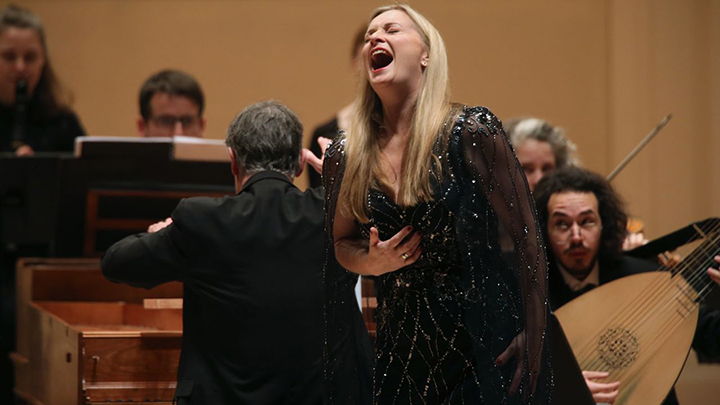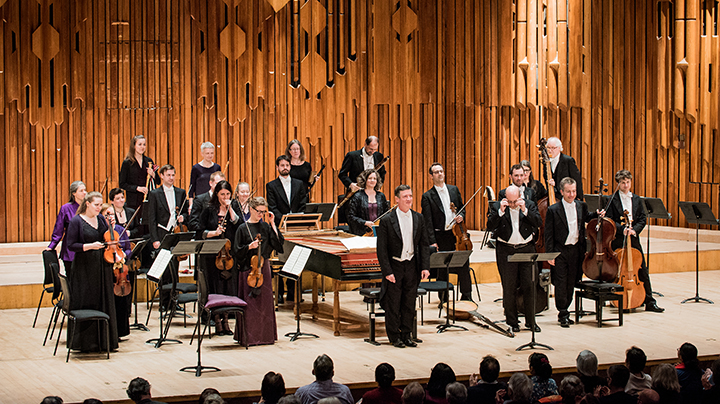
This claim is not due to the fact we are in the midst of another Messiah marathon—it goes deeper than providing the soundtrack for genteel yuletide gaiety. Rather, I struggle to think of another composer whose body of work so deftly captures the two-sided nature of political conflict: the righteous, blinding fervor of those who beat the drums of war, and the acute distress and moral grappling of those who must learn to live in its echoes. Verdi, especially in Les vêpres siciliennes, comes close, but Handel manages to examine both sides with an equal degree of compassion, curiosity, and expressivity.
If last week’s performances of Rodelinda, regina de’ Longobardi with The English Concert at Carnegie Hall and Judas Maccabeus with the American Symphony Orchestra at Riverside Church were opposing examinations of the dual Handelian view on conflict and its effects on both the collective and individual, then they were also case studies in how effective conducting (or the lack thereof) can either illuminate or hinder a piece’s overall thematic legibility.
Of course, The English Concert, performing the New York leg of their Rodelinda tour, has the benefit of being under the direction of Harry Bicket, one of our foremost interpreters of Handel’s works. Long-acclaimed as one of Handel’s most psychologically astute pieces, the opera presents the fallout of a coup that sees Lombardy’s rightful ruler, Bertarido, forced into exile and presumed dead, his family imprisoned, and a host of political and interpersonal machinations at play as the new regime attempts to assert its legitimacy. Bicket’s, leading from the harpsichord, and his ensemble’s playing was assured and cohesive throughout. A fleet-footed yet unharried reading of the overture immediately situated the listener in a world of shifting political alliances, drawing a spectrum of color and textures amidst the score’s more conventionally grandiose trappings.
Under Bicket, the score moved: supported by a propulsive continuo, the upper strings and winds swelled and arched with unflagging energy and the orchestral flourishes, especially in the pastoral scenes at the ends of acts one and three, emerged crisp and sparkling. This emphasis on sustaining forward movement had the effect of underpinning the piece’s many introspective moments. When the largo movements and lamenti came, Bicket allowed them the space to expand and linger, rendering moments of comparative quiet and stillness — especially those featuring echo effects — all the more poignant. While this effect can be attributed largely to the conductor’s instinct for tempo, it would not have taken flight without the ensemble’s airtight playing. Special mention goes to the superb work of Tatjana Zimre, Bethan White, and Katrin Lazar on recorder and Rosemary Bowker on flute.
A superb roster of singers, all well versed in the intricacies of the Baroque style, joined them. Lucy Crowe displayed a potent, silvery soprano and an astute dramatic instinct, bringing out the titular queen’s grief and moxie in equal measure. Her “Spietati, io vi giurai” was deliciously spiteful thanks to more than a few smart ornamentation choices. As the seconda donna, Eduige, Christine Rice’s pliant mezzo lacked some resonance, but her command of the text and rather wry take on the character enlivened her interpretation.
Countertenor Iestyn Davies was a remarkable Bertarido. Entering the stage from the parquet, he let forth a gorgeous cascade of sound during the opening bars of “Dove sei, amato bene?” His opalescent timbre was delicate yet incisive, ensuring that the heroic coloratura of “Vivi, tiranno” remained stirring and secure throughout the piece’s leaps. During “Io t’abbraccio,” one of Handel’s loveliest duets, his and Crowe’s voices flowed in and out of each other as if rippling through melted silver—an ethereal effect.
Eric Ferring was a stylish Grimoaldo and managed the role’s relatively low tessitura without comprising his tenor’s inherent brightness and sweetness. He was equally as convincing in the roiling allegro of “Tuo drudo è mio rivale” as he was in the more reflective strains of “Pastorello d’un povero armento,” where his phrasing was beautifully parsed and sustained. Aryeh Nussbaum Cohen, playing the virtuous counsellor, Unulfo, displayed a rounded, rosy tone and a solid command over his dynamic range, if he was not quite as rhythmically rigorous as his colleagues. His top register, however, was in full bloom. Bass-baritone Brandon Cedel lent his mahogany hued sound and ample power to Garibaldo, the evil advisor, along with a fair amount of moustache twirling.
Uptown, it was a much different story. Granted, Judas Maccabeus has less to offer in the way of psychological acuity or sheer Baroque melodrama. Among Handel’s oratorios, it features neither the dramatic intensity of Saul or Jeptha, nor the spiritual sublimity of Theodora. Nor did it produce any longstanding repertoire standards: indeed, its most famous excerpt, “See, the Conquering Hero Comes!” was originally composed for the later Joshua. Written to celebrate the Duke of Cumberland’s routing of the Jacobites at the Battle of Culloden, it is a fairly straightforward, if patriotically Protestant, retelling of the Maccabean Revolt featuring a rather clunky libretto by Thomas Morell. Needless to say, it was a hit in its day.
If there is a case to be made for the piece as anything other than a Hanukkah alternative to Messiah, conductor Leon Botstein failed to make it. While illuminating and valuable interpretations of the Baroque repertoire exist beyond the scope of historically informed performance practices, this was not one of them. Botstein was content to simply mark the downbeats and keep matters plodding along at a mezzo forte, occasionally allowing for a more dynamic variance for a few martial choral outbursts. Yet his failure to effectively shape preceding choruses and lamentation, to make palpable the collective suffering and anxiety that drives the Israelites to take arms, blunted the effect of these rate moments of excitement. It cannot even be said that he marked his tempi successfully, as there were several points were the soloists and orchestra were not together. The chorus and soloists often seemed to be operating at a different energy level than the orchestra, making for an overall disconnected and wan soundscape emanating down the nave of Riverside Church.
Nevertheless, Jack Swanson as Judas sliced through the mire with his bright, agile tenor and well-supported top notes. He dispatched with the coloratura of “Sound An Alarm” with verve and was every bit the conquering hero of the evening. As Simon Maccabeus, Baritone William Guanbo Su brought excellent diction and plummy, resonant sound to his first aria, “Arm, arm ye brave,” which significantly lifted the evening’s proceedings. He displayed a remarkable ability to contour and add character to his recitatives despite the limp continuo beneath him.
Although the acoustics in Riverside and other cathedrals like it can be challenging, soprano Brandie Sutton and mezzo soprano Deborah Nansteel, as Israelitish Woman and Man respectively, struggled to make themselves heard. Sutton in particular lapsed in and out of audibility in her middle range and faced intonation problems during several of her runs. It was an off night for her, to be sure. Under more capable direction, Nansteel’s burnished mezzo might have found its way out of the fray, but it remained a distant prospect.
The Bard Festival Chorale, joined by members of the Riverside Choir, acquitted themselves admirably under Botstein’s unsteady baton. Choristers Alison Gish and Roderick Gomez as the Israelitish Messengers and Steven Moore as Eupolemus, the Jewish Ambassador to Rome, made the most of their brief cameos, showing a level of commitment and dramatic intention that was sometimes in short supply with the primary soloists and utterly lacking with the conductor.
Photo: Steve Sherman



























Comments